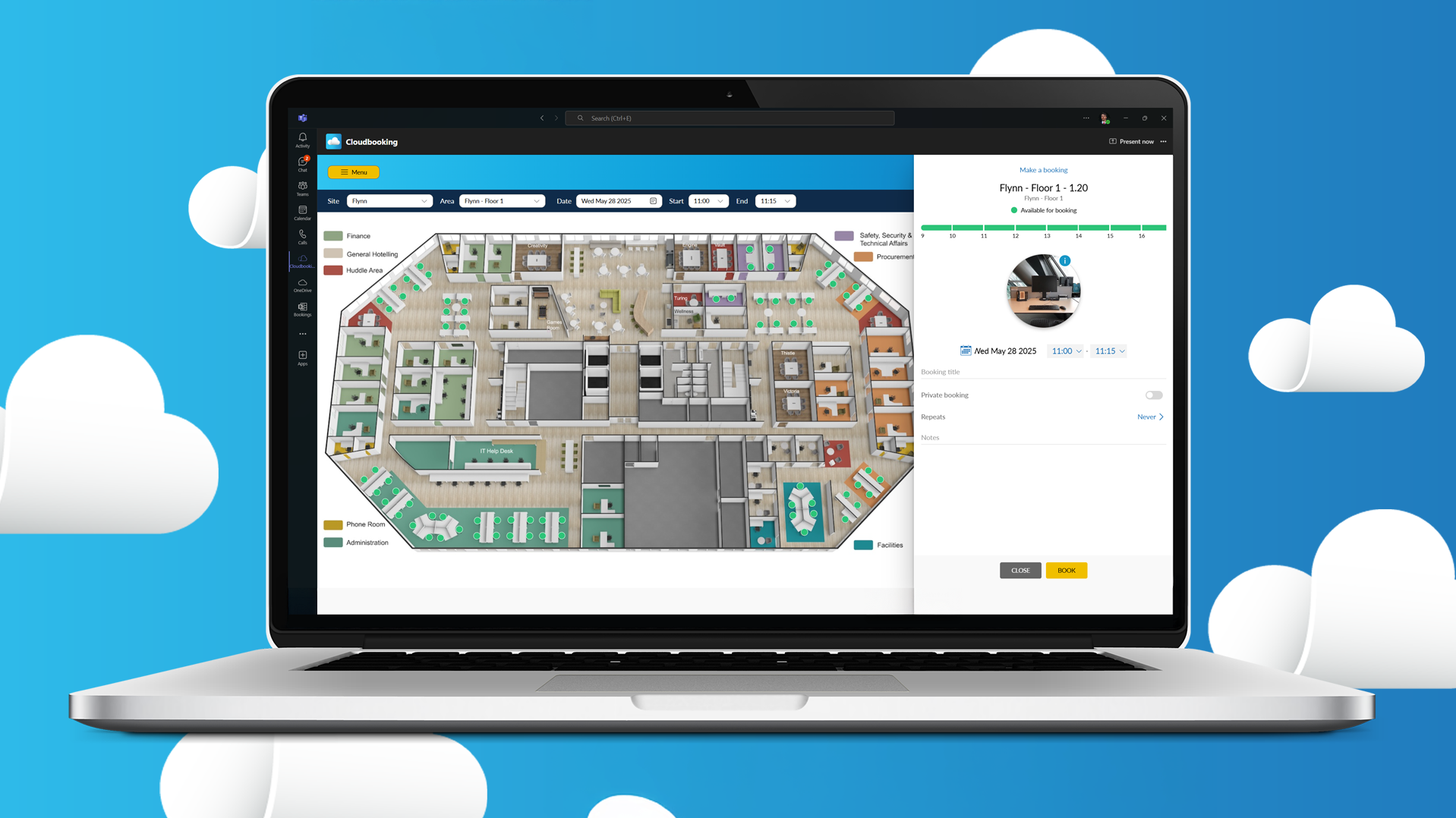
The way businesses operate is changing. Remote and flexible working is on the rise, with traditional office spaces and culture being reshaped for the modern era at a faster rate than ever before. Real estate consolidation is becoming a priority for businesses across diverse sectors as they adapt to the changing environment. In this post, we will explore the impact of consolidating real estate on your people and workplaces.
Get a free demo
Enquire about a no-obligation demo today and get an exclusive hybrid working research paper — for free. Created in partnership with YouGov, this invaluable guide provides essential insights into developing your own effective hybrid strategy. Click below.
What does real estate consolidation mean in business?
Real estate consolidation is the process of combining multiple real estate holdings into a single location. This may mean moving employees from various locations to one central office, or it could involve shutting down certain offices and consolidating those staff members into other areas. Increasingly, a shift to remote and flexible working is a part of this process.
What are the benefits of real estate consolidation for businesses?
The primary benefit for businesses of consolidating office space is the cost savings it brings. Operating multiple physical workspaces comes with a range of costs. This can include the cost of purchasing real estate, leasing, maintenance, and operational costs such as utilities.
By consolidating real estate, businesses can significantly reduce – and in many cases eliminate – some of these costs. These cost savings increase a businesses’ net profit, which can then be used in several ways, such as investing in innovation and growth, increasing employee salaries, and investing in new technologies or talent.
Workers can benefit from real estate consolidation strategies too. In many cases, workers are keen to move to remote working, at least some, if not all, of the time. It gives them greater flexibility and autonomy over their schedules and workload. It saves them money and time on commuting, translating into a better work-life balance and improved personal lives.
Why do businesses require less physical space nowadays?
One factor driving this trend is how we work and increase work from home opportunities, with many people now preferring remote working over being tethered to an office desk all day long. Recent shifts in the way we work have led to more people than ever before requesting to work remotely.
With fewer people in the office, it no longer makes sense for businesses to pay the running costs of near-empty spaces. A company has minimal workers but spread out across multiple locations, and it makes sense to consolidate these into one spot.
The global pandemic has also put a strain on many businesses. While a few have profited during this period, many have struggled to keep afloat in the uncertain landscape. For struggling businesses, the cost of maintaining empty workspaces was a real challenge.
Lockdowns proved that people are capable of working remotely and adapting quickly to these new challenges. Businesses realized that the operational costs associated with physical workspaces were putting them at risk in uncertain times. Real estate consolidation is a smart move for many companies, ensuring they have a greater chance of survival should they be hit with unpredictable events in the future.
Technology has played a significant role in shaping how businesses operate nowadays. Technological advancements mean there is less of a need for physical workspaces. Technology facilitates flexible working through access to network solutions and the use of mobile devices.
Cloud-based solutions have significantly reduced the need for equipment and personnel that would previously have taken up a significant amount of physical space. Instead of housing IT infrastructure onsite, businesses can now benefit from managed cloud-based systems and software. Such solutions are easily accessed via the internet, with the management of them being outsourced to specialist companies. The latter removes the need for large IT teams within companies and ensures businesses do not need to house servers onsite.
On a similar note, IT advancements have meant that paper-based filing and working systems have become virtually obsolete. In the past, much office space would have been taken up by storage systems. Today, companies can operate with minimal paperwork and physical storage solutions which allows them to reduce their physical workspaces considerably.
How to consolidate business real estate: what should be preserved and why?
When companies are considering consolidation of physical space, the question often is: what should be kept and why? There are two primary considerations when it comes to deciding what will be saved. These are productivity and culture.
Ensuring productivity is a crucial concern of businesses because it directly impacts revenues and the quality of service a company can provide. A workspace can affect productivity in several ways.
For some, the switch to remote working is a risk to productivity because workers are not directly supervised and may slack off when nobody is looking. They may also be distracted by home comforts or others in their household. They may also be hindered by slow internet connections or outdated or unsuitable technologies. However, it should be noted that many businesses have found employees to be at least as productive, if not more so, when working from home for extended periods.
Conventional workspaces can also impact the productivity of workers in many ways. Location, noise levels, space, layout, temperature, lighting, décor, and workplace culture can impact productivity. Businesses must factor these things in when consolidating real estate.
Workplace culture is another important factor when consolidating real estate. Contemporary businesses place a considerable emphasis on creating a workplace culture that will allow workers to thrive and collaborate effectively while promoting employee wellbeing and retention.
Consolidating real estate can positively or negatively affect workplace culture, depending on how it is done. Many people are concerned that the shift to remote working will negatively impact workplace culture. Young professionals, in particular, tend to prefer working in a physical office rather than at home. They enjoy the social elements of work.
Businesses must seek ways to preserve or enhance the culture of their workplaces while consolidating real estate if it is to be a success. Otherwise, they risk losing valuable employees or finding it difficult to attract new talent.
How can the potential negative impacts of consolidation be mitigated?
Businesses must seek innovative ways to mitigate the potential downsides of consolidation if they want to thrive in this new environment.
Involving workers in the decision-making process is key to getting them on board. Before the consolidation of real estate, businesses should seek employee opinions and feedback. This can be done through focus groups or staff surveys, for example.
Listening to employees’ views and concerns will go a long way to ensuring they feel valued and respected. Listening alone is not enough, however. These views must be taken into consideration during the decision-making process, with transparency being central. While it may be impossible to keep everyone happy, companies should demonstrate that employees’ views have been taken on board and be clear about how and why decisions have been reached.
When employees understand the reasoning behind critical decisions and feel part of the process, they are more likely to adapt quickly and accept the changes.
Once decisions have been made, businesses should turn their attention to devising policies and practices which mitigate the potential negative impacts on productivity and workplace culture.
Managers may need special training to ensure they can adapt to managing remote workers effectively. New technologies should be explored which may facilitate better communication, management, and collaboration. These things will help to mitigate the negative impact on productivity that could occur.
Companies must carefully consider strategies to ensure productivity does not diminish. Robust procedures should be in place from the outset. Expectations must be clearly conveyed and upheld. Appropriate support and guidance must be in place for employees to ensure their wellbeing is promoted and they do not fall behind for any reason.
One way of ensuring the continued progression of employees, regardless of where they are located, is by investing in training. This could be delivered online or in-person but should be of high quality and provide value for both the employee and business.
Where employees are relocated, companies should invest in team-building and social events. This will help people settle in, feel comfortable and facilitate the group formation process. Remote workers should be included in this process since they are just as much a part of the team.
Regular team-building days and social events would be beneficial over time to reinforce this ethos. This will help to create a positive, social and team-focused culture within the organization. Modern technologies can also be used to create virtual meetups and facilitate collaboration.
Conclusion
The way businesses operate is fundamentally changing. With flexible and remote working on the rise, many companies are focusing on real estate consolidation to reduce costs and meet the demands of the modern workforce. While this can benefit both the business and its workers, there may be some detrimental effects to productivity and workplace culture. To mitigate these, companies must involve employees in the decision-making process and be innovative when finding solutions.
We can help you consolidate your real estate with our workspace management system. Contact us now to make your business part of the workspace revolution and receive a free demo of our system.


